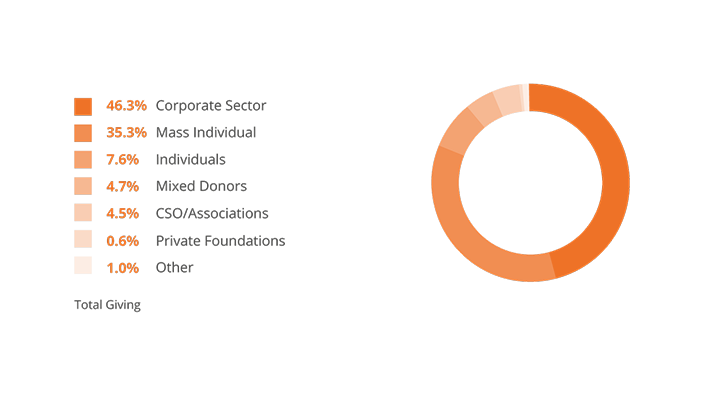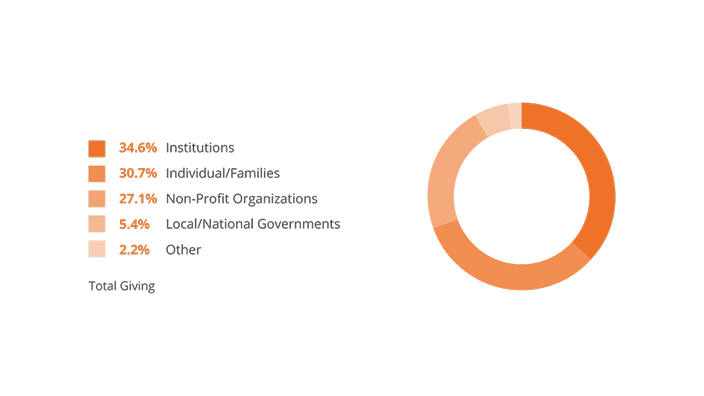As part of The state and future of philanthropy business meeting conducted by the Mozaik Foundation with partner organizations and with the support of USAID, on November 3 at the Hills Hotel in Sarajevo, at the event organized to improve the legal framework for philanthropy, we presented the results of our annual research on the state of philanthropy by providing key insight of the "Giving Bosnia and Herzegovina 2020" report.
According to our estimates, philanthropic donations in Bosnia and Herzegovina increased significantly in 2020 regarding donated amounts. The estimated value of donations is € 38.5 million, almost three times more than the previous year. Even when all donations aimed at the pandemic are excluded, the amount donated exceeds the amount of all donations from 2019. This increased average per capita donations from € 3.7 in 2019 to € 11.7 in 2020.
Donors and purposes of giving
Unlike the previous year, the corporate sector recorded the highest donations, both in terms of the number of shares and the amount donated. The growth in corporate giving was exceptionally driven by the Covid-19 crisis, for which businesses set aside three-quarters of the donated amount. On the other hand, Citizens generated smaller amounts through mass donations, but most of their contributions focused on topics unrelated to the Covid-19 pandemic. In addition to Covid-19, the most common issues in 2020 were assistance to marginalized groups, education, health, and poverty.
The diaspora maintained a similar level of participation as the previous year, with almost a 10% share of the total donated value, directing two-thirds of that amount to COVID-19-related topics.

Recipients of donations
The most significant change that has taken place on the philanthropic scene relates to the significantly greater support that the state has received. Benefits were mostly directed at institutions, and support for different levels of government even doubled. While institutions and authorities received more support to deal with the pandemic, individuals and families, along with nonprofits, received more for areas not directly related to the Covid-19 crisis. Thus, the state was recognized as the main channel of assistance in overcoming the pandemic. At the same time, the nonprofit sector remained the primary mediator between donors and beneficiaries, primarily members of marginalized groups.

The trend of giving
The Society of Bosnia and Herzegovina is showing increasing concern for philanthropy from year to year. We have recorded a steady increase in philanthropic activities in the last five years, culminating in giving in 2020, when the recorded amount was € 8.9 million. Compared to 2016, this amount represents an increase of as much as 523 %. In doing so, these are exclusive benefits that were not aimed at the Covid-19 crisis. In this regard, it should be taken into account that part of the funds spent on crisis mitigation could be redirected to other purposes, which would make the amount of these benefits in 2020 even higher. This information is encouraging but also raises higher expectations of the philanthropic community in the coming period.

The full report is available at this link.
Giving Bosnia and Herzegovina 2020: The Annual Report on the State of Philanthropy is part of a broader initiative to promote and encourage philanthropy in the region by the Catalyst Foundation. The research in question and this publication were designed by the Catalyst Balkans with the generous support of the C. S. Mott Foundation and the Rockefeller Brothers Fund.
The views expressed in this publication do not necessarily reflect the views of the C. S. Mott Foundation and the Rockefeller Brothers Foundation or their partners.


Leave a comment